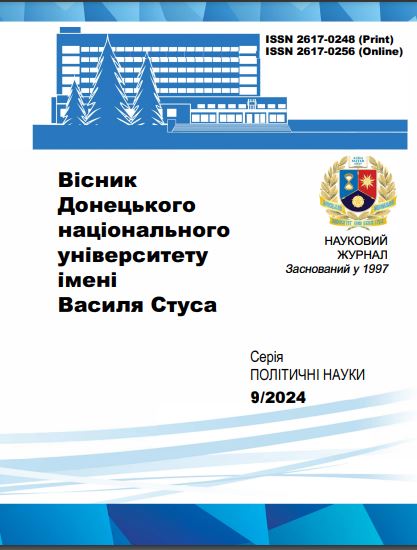War, blitzkrieg, looting, and lives in exchange for equipment: the Russian invasion from the perspective of selectorate theory
DOI:
https://doi.org/10.31558/2617-0248.2024.9.2Keywords:
Russian invasion, selectorate theory, blitzkrieg, looting, autocraciesAbstract
The article presents the selectorate theory as a concept suitable for explaining the Russian invasion of Ukraine. This involved reducing a number of behavioral patterns of the Russian military and political command to typical actions of an authoritarian regime. The Russian political leadership’s reliance on a military solution to interstate conflicts and a risky blitzkrieg as the main battle plan is consistent with the logic of autocracies. They tend to make risky and ill-considered decisions primarily because the leaders of small coalition regimes do not need to be accountable to their voters. Therefore, the personal consequences of defeat are not so bad for them, unlike democratic regimes, which are critically dependent on the opinion of citizens, that’s why democratic regimes try to choose their wars more carefully, emphasizing those with the best chance to succeed. The unprofessionalism of the Russian army is revealed in the numerous – and sometimes trivial – facts of looting and robbery of civilians. For several millennia, autocracies have shown a tendency to legitimately reward their soldiers with the possibility of obtaining “trophies” of this kind. Finally, the shocking facts of the Russian military and political leadership’s disregard for the health and lives of its own soldiers, rooted even in the organizational structure of the Russian army, refer to the perverse scale of values of autocratic regimes. Its essence can be reduced to the following dichotomy: an emphasis on the primary value of weapons and equipment that can be used against the leader and thus threaten his survival, and the absence of any concern for the renewable, unorganized, and therefore non-threatening human lives of his own soldiers. It is based on the weak connection between the population and the autocrat’s focus on power, which makes it politically unreasonable to care about the equipment, health, and lives of the largest part of the (Russian) army.
References
Mesquita B. B. d., Smith A. Dictator’s Handbook: Why Bad Behavior Is Almost Always Good Politics. New York: PublicAffairs, 2011. 352 p.
Mesquita B. B. d., Smith A., Siverson R. M., Morrow J. D. The Logic of Political Survival. Cambridge: The MIT Press, 2003. 550 p. https://doi.org/10.7551/mitpress/4292.001.0001
Peceny M., Beer C. C., Sanchez-Terry S. Dictatorial Peace? The American Political Science Review. 2002. 96(1), Pp. 15–26. http://www.jstor.org/stable/3117807
Reiter D., Stam A. Democracies at War. Princeton: Princeton University Press, 2002. 304 p.
Reiter D., Stam A. Identifying the Culprit: Democracy, Dictatorship, and Dispute Initiation. American Political Science Review. 2003. 97(2), Pp. 333–337. doi:10.1017/S0003055403000704
Frye T. Weak Strongman. The Limits of Power in Putin’s Russia. Princeton/Oxford: Princeton University Press, 2021.
Treisman D. (ed.). The New Autocracy: Information, Politics, and Policy in Putin’s Russia. Washington: Brookings Institution Press, 2018. 336 p.
Ukraine: Freedom in the World 2022 Country Report | Freedom House. Freedom House. URL: https://freedomhouse.org/country/ukraine/freedom-world/2022 (date of access: 18.09.2024).
Russia: Freedom in the World 2022 Country Report | Freedom House. Freedom House. URL: https://freedomhouse.org/country/russia/freedom-world/2022 (date of access: 18.09.2024).
Democracy Index 2022 | Economist Intelligence Unit. Economist Intelligence Unit. URL: https://www.eiu.com/n/campaigns/democracy-index-2022/ (date of access: 18.09.2024).
Lai B., Slater D. Institutions of the Offensive: Domestic Sources of Dispute Initiation in Authoritarian Regimes, 1950–1992. American Journal of Political Science. 2006.Vol. 50, No. 1. Pp. 113–126. https://doi.org/10.1111/j.1540-5907.2006.00173.x
Croco S. E., Weeks J. L. War Outcomes and Leader Tenure. World Politics. 2016. 68(4), Pp.577–607. https://doi.org/10.1017/s0043887116000071
Connable B., Doll A., Demus A., et al. Russia’s Limit of Advance: Analysis of Russian Ground Force Deployment Capabilities and Limitations. https://www.rand.org/content/dam/rand/pubs/research_reports/RR2500/ RR2563/RAND_RR2563.pdf (date of access: 18.09.2024).
Clarkson A. Russia Couldn’t Occupy Ukraine if It Wanted to. Foreign Policy. URL: https://foreignpolicy.com/2022/02/03/russia-couldnt-occupy-ukraine-if-it-wanted-to/ (date of access: 18.09.2024).
Zabrodskyi M., Watling J., Danylyuk O. V., Reynolds N. Preliminary Lessons in Conventional Warfighting from Russia’s Invasion of Ukraine: February–July 2022. Royal United Services Institute for Defence and Security Studies, 2022. URL: https://www.rusi.org/explore-our-research/publications/special-resources/preliminarylessons-conventional-warfighting-russias-invasion-ukraine-february-july-2022 (date of access: 18.09.2024).
Frantz E., Ezrow N.M. The Politics of Dictatorship: Institutions and Outcomes in Authoritarian Regimes. Boulder: Lynne Rienner Publishers, 2011. 133p.
Watling J., Danylyuk O. V., Reynolds N. Preliminary Lessons from Russia’s Unconventional Operations During the Russo-Ukrainian War, February 2022–February 2023. Royal United Services Institute for Defence and Security Studies, 2023. URL: https://rusi.org/explore-our-research/publications/special-resources/preliminary-lessonsrussias-unconventional-operations-during-russo-ukrainian-war-february-2022 (date of access: 18.09.2024).
Gomza I. Putin’s Inevitable Invasion. Journal of Democracy. 2022. 33(3). Pp. 23–30.
Gel’man V. Why the Kremlin Invaded Ukraine – Riddle Russia. Riddle Russia. 2022, March 12. URL: https://ridl.io/en/why-the-kremlin-invaded-ukraine/?fbclid=IwAR3pTfh9R-exXh_AuLAwhqbW8ZZMLIsCgnEg0xz_JGE2Rwi1sfBujZ8e2M (date of access: 18.09.2024).
Gelpi C., Grieco J. M. Attracting Trouble. Journal of Conflict Resolution. 2001. 45(6). Рр. 794–817. https://doi.org/10.1177/0022002701045006005
Yaffa J. Inside the U.S. Effort to Arm Ukraine. The New Yorker. 2022, October 17. https://www.newyorker.com/magazine/2022/10/24/inside-the-us-effort-to-arm-ukraine (date of access: 18.09.2024).
Galeotti М. Putin’s Wars: From Chechnya to Ukraine. Oxford: Osprey Publishing, 2022. 401р.
The Battle of Hostomel Airport: A Key Moment in Russia’s Defeat in Kyiv – War on the Rocks. War on the Rocks. URL: https://warontherocks.com/2023/08/the-battle-of-hostomel-airport-a-key-moment-in-russias-defeat-in-kyiv/ (date of access: 18.09.2024).
Kendall-Taylor A., Frantz E. After Putin: Lessons from Autocratic Leadership Transitions. The Washington Quarterly. 2022. 45:1, Pp. 79–96.
Zelenskyy articulates the Russian dream: “To steal a toilet and die”. Ukrainska Pravda. URL: https://www.pravda.com.ua/eng/news/2022/04/22/7341485/
Schwirtz M., Troianovski A., Al-Hlou Y., Froliak M., Entous A., Gibbons-Neff T. Putin’s War: The Inside Story of a Catastrophe. The New York Times. 2022, December 17. https://www.nytimes.com/interactive/2022/12/16/world/europe/russia-putin-war-failures-ukraine.html?fbclid= IwAR1stdBhRgWbcmwNfT6c01JQLJcTfirWrmbyL52-pZSQfuR9X0yP6ytSp7U (date of access: 18.09.2024).
Berkowitz B., Galocha A. Analysis | Why the Russian military is bogged down by logistics in Ukraine. Washington Post. 2022, March 30. https://www.washingtonpost.com/world/2022/03/30/russia-military-logisticssupply-chain/?fbclid=IwAR2zaKhH2EnRbBPM2jMBEouWwYSGa9Q60reiCzD2W9riI-4kvJqBXeReMi0 (date of access: 18.09.2024).
Wrong M. I Didn’t Do It for You: How the World Betrayed a Small African Nation. London, New York: HarperCollins, 2005. 432 p.

